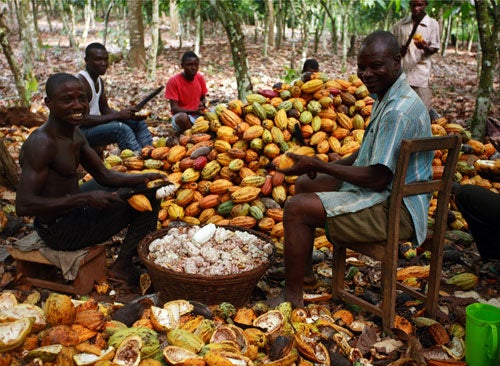One-Year Post-Doctoral Fellowship:
6 Months at the University of Michigan / 6 Months in Ghana
January-December 2017
The Ghana-Michigan Post-doctoral And Research Trainee NEtwoRk –
Investing in Innovation (PARTNER II)
Applications are now being accepted for a new NIH Fogarty International Center-funded post-doctoral fellowship opportunity that will examine the multi-level linkages between agriculture, infection, and nutrition among smallholder farming households in Ghana. The project is based out of the University of Michigan, School of Public Health with six months placement in Ann Arbor, MI, USA, and six months in Ghana.
Citizens and permanent residents of Ghana and the U.S. are eligible to apply, but please note that there are separate application processes depending on citizenship. The deadline for applications is September 16, 2016. See below for full details of the application process and requirements.
Focus: Strengthening agriculture and food systems to address the burden of undernutrition and infection among women and children in Ghana
APPLICATION GUIDELINES FOR CITIZENS/ RESIDENTS OF THE USA — DOWNLOAD HERE
APPLICATION GUIDELINES FOR CITIZENS/ RESIDENTS OF GHANA — DOWNLOAD HERE
KEY DATES
- Submission of full application: Sept 16, 2016
- Approximate Date of notification of decision: Oct 15, 2016
- Approximate date of arrival at University of Michigan: Early-mid January, 2017
PURPOSE
The Ghana-Michigan Post-doctoral And Research Trainee NEtwoRk – Investing in Innovation (PARTNER II) is a multi-year grant funded by the Fogarty International Center in the US National Institutes of Health. The overall objective of this grant is the strengthening of interdisciplinary research capacity in Ghana and at the University of Michigan to address global health challenges faced by low- and middle-income countries (LMICs). A key strategy to accomplish this goal is the offering, in a single grant year, 6 one-year postdoctoral fellowships to form two cross-disciplinary teams consisting of a total of 4 post-docs from Ghana and 2 post-docs from the US, together with 4 or more senior scientist mentors: 2 or more at the University of Michigan and 2 or more at institutions in Ghana. Successful post-doctoral applicants for the team in this round will reside as Visiting Scholars during January 2017 through July 2017 at the University of Michigan in Ann Arbor, Michigan, USA and July 2017 through December 2017 in Ghana working full time on the research. All costs associated with the fellowship (stipend [based on NRSA/NIH guidelines: see here], travel, visa charges, health insurance and modest research allowance) will be provided through the grant.
Successful applicants for this award cycle will work as part of interdisciplinary teams examining the multi-level linkages between agriculture, infection and nutrition among smallholder farming households in Ghana. Two teams of three fellows each will be formed, one with a disciplinary focus on maternal and child nutrition, and the other on infectious disease ecology. The two teams will work closely together on the design of research questions, protocols, and implementation. Preference will be given to applicants with demonstrated experience designing and implementing field-based research projects in Ghana, drafting detailed research protocols, and communicating research results for academic audiences. Applicants may propose their own research idea or work with Michigan and Ghanaian mentors to tailor their post-doctoral project to existing, ongoing research.
Profs. Mark Wilson and Andrew Jones will be the University of Michigan based co-leaders of the teams of fellows. Prof. Wilson is an epidemiologist and ecologist with broad research interests in infectious diseases, including the analysis of transmission dynamics, the evolution of host-parasite-environment dynamics, and multivariable determinants of human disease risk. Much of his research examines how environmental and social variation in time and space impact on pathogenic microbe transmission and disease expression in third world settings. Recent projects have addressed transmission, prevention and control of malaria, dengue, tuberculosis, and other infections. Studies employ various field, laboratory, and statistical techniques that include satellite image data and GIS for spatial analyses of environmental changes and disease patterns. Mark is currently Professor of Epidemiology in the School of Public Health at the University of Michigan (U-M), and Professor of Ecology and Evolutionary Biology in the College of Literature, Science and the Arts at U-M.
Prof. Jones’ research is centered on understanding the influence of agriculture and food systems on the nutritional status of women and children in low- and middle-income countries (LMICs). He examines: i) the extent to and mechanisms via which agricultural and landscape biodiversity influences diet quality and food security among smallholder farming households in LMICs; and ii) the extent to which animal agricultural production impacts anemia among adolescent girls and women of reproductive age through both nutrition- and infection-related pathways. Andrew is currently Assistant Professor of Nutritional Sciences in the School of Public Health at the University of Michigan (U-M), and Research Assistant Professor in the Center for Human Growth and Development at U-M.



